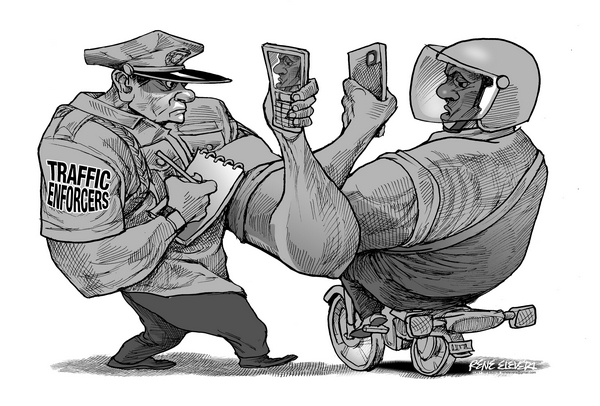
A proposal by the Cebu City Traffic Operations Office (CCTO) to purchase body cameras to augment their operations is a double-edged sword, but it gained credence in light of a recent video that went viral on social media.
The video showed a young female motorcycle passenger who cursed and then slapped a traffic enforcer of the Metro Manila Development Authority (MMDA) after he caught her not wearing a crash helmet while passing through Visayas Avenue in Quezon City.
The female, whose face was pixilated to cover her identity pending her explanation on the incident, supposedly ate food placed on her crash helmet while riding along the area.
She explained that she went ballistic or “beast mode” since she hadn’t eaten all day and got ticked off by the traffic enforcer’s public scolding of her which she apparently deserved since she violated the “No Crash Helmet” traffic policy in the first place.
Criminal charges will be filed against the female passenger and whether or not the case will prosper is anyone’s guess for now.
What the incident showed is that effective use of body cameras can make any violator think twice about acting rude and indignant over being caught.
But this wasn’t the first time that social media was used effectively to call out traffic violators to task.
Former government worker and radio blocktimer Roger Cimafranca knows it only too well.
Three years ago, Cimafranca was caught on cellphone video by traffic enforcer Lyndon Ocampo threatening and insulting him after Ocampo refused his request not to be issued a ticket for a traffic violation.
The video went viral and Cimafranca lost his job as liaison officer of the Association of Barangay Councils (ABC) as a result.
Flash forward to that Quezon City incident involving the female motorcycle passenger and we have an idea how body cameras can be a deterrent to abusive behavior by traffic violators.
In her case, the video went viral on social media and, just like the Cimafranca case, invited strong public backlash from netizens.
By hiding her face, the MMDA was careful not to invite counter charges and avoided suspicions of intentionally shaming her in public.
Which is why using body cameras, while advantageous to traffic enforcers, is a double-edged sword since there will be unavoidable speculations that these devices can be used to show only one side of the traffic incident.
Like cops who were required to wear body cameras during operations, these devices can be turned on and off at the wearer’s pleasure and necessity.
The Cebu City government can afford to outfit their traffic enforcers with body cameras, but they should be reminded to use them with utmost responsibility and care.
For city traffic enforcers, having an extra pair of eyes to record one’s handling of violators can be useful if used responsibly.